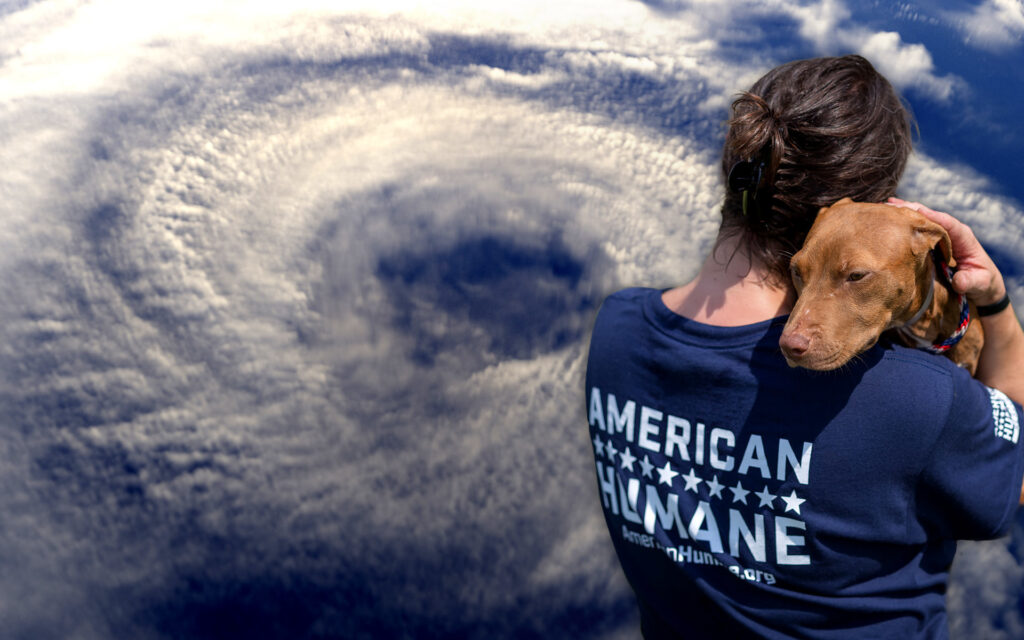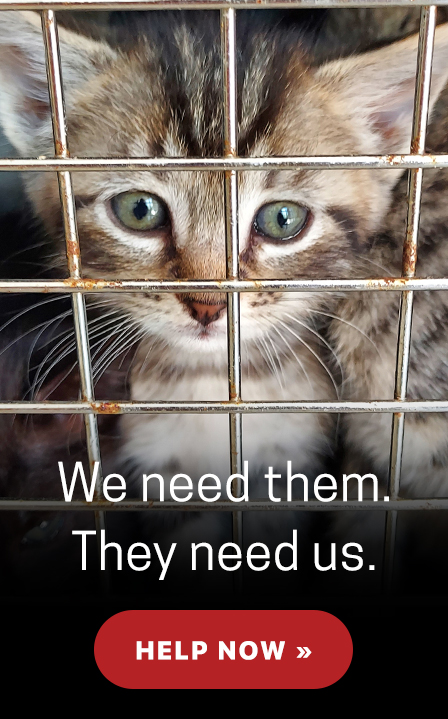In her new book Mission Metamorphosis, American Humane’s president and CEO Dr. Robin Ganzert tells the story of her tenure at American Humane and offers insightful, actionable advice for nonprofit leadership. The following excerpt offers a glimpse at how business lessons are interwoven with stories of American Humane’s lifechanging work.
The voice on the other end of the phone line was exhausted. “Robin,” my director of rescue team operations asked, “do you know someone in North Carolina who has a truck?”
An American Humane rescue truck, on its way to the Hurricane Florence impact zone, had broken down in Raleigh. Flooding from the hurricane had contaminated underground tanks of fuel in the surround-ing area with water. After our American Humane truck filled up at a local gas station, its engine sputtered out, stopping the operation dead in its tracks.
It was a do-or-die situation. The truck was hauling boats that our American Humane Rescue team needed to traverse the floodwaters of Hurricane Florence. Either we could get the rescue boats to the impact zone and start saving animals, or we would fail in our mission to be first to serve whenever animals are in need. If we couldn’t get our rescue boats there, we’d let down those we had promised to help.
In this situation, failure wasn’t an option. So I turned to a constant source of support in my life—my mom. I reached for my phone.
“Mom,” I said, “I need a truck. I’ve got a big trailer full of rescue boats in Raleigh. Can you help?”
“Well, Robin,” my mother replied, “you know Scott, the man who shoes our horses? Scott will come.”
I immediately got Scott, who was in Mocksville, North Carolina, on the phone. “Scott,” I explained, “our rescue truck is stuck, and I need your help. It’s already 5:30 p.m., and we should already be in the water, rescuing animals. Can you help me?”
“I’ll be there,” Scott replied without hesitation. But then he asked, “Robin, I’ve got to take a meatloaf out of the oven. Can I do that first?”
“Absolutely,” I said, “it may be your only hot meal for days. But if you drive through the night, then we’re going to be able to start saving animals by morning.”
When you’re trusted with saving the lives of animals in danger, things can get hectic and tense. It requires a lot of grit and a lot of guts from our team members, full-time staff, volunteers, donors, and everyone in between to get the job done.
At the very heart of what we do, we are a humanitarian organization, the boots on the ground and first to serve all animals. We respond to the needs of animals whenever and wherever they are—whether they are caught up in a natural disaster and in need of rescue; on a movie set where they need protection; or in a farm, aquarium, or zoo where their welfare needs are not being met. That is where we lead, setting the standard and determining what it is to be humane. We act as the voice for the voiceless—rescuing, sheltering, protecting, and keeping animals safe from harm.
During Hurricane Florence, we were able to serve once again. Scott drove his own truck to Raleigh, where he picked up our truck and trailer at 9:30 p.m. He drove it to the staging area where the rescue boats were being launched. By sun’s light the next morning, our American Humane boats—with our volunteers and experts in water rescue—were in the floodwaters, saving lives.
Rescue is a 24-hour-a-day job, and it’s not for the faint of heart. Frankly, some of the situations we find ourselves in can turn even the strongest stomachs, including my own. I sent my youngest rescuer, Amber, to help with our disaster response. Amber had responded to many disasters but none of this magnitude. She was trained for it, however, and felt in her heart of hearts she was ready for whatever was to come.
When a young person tells me they’re ready to do this type of work, I believe them and send them into action. But I send them knowing they are going to be changed forever as a result of what they see, experience, and do. I always worry about compassion fatigue.
Amber got into the boat with our most experienced swift-water res-cuer—our director of rescue operations—and they motored into the North Carolina floodwaters, not sure what they would find. As they approached a mobile home, they heard dogs barking. The home’s porch was about four feet high, and it was completely underwater, and the inside of the home was four feet deep in dark, contaminated water. They waded into the flooded living room in their drysuits, where they found six pit bulls—all barking wildly, as if their lives depended on it. It was only when our team cautiously approached the frightened dogs that they figured out how some had managed to survive. The desperate animals were standing on the dead bodies of their littermates.
The team brought the surviving dogs onto our American Humane boats, which carried them to safety, to hope, and to compassion—an emotionally and physically draining undertaking and just one rescue among many.
It takes everyone giving their all to complete a successful rescue mis-sion. It takes a farmer in North Carolina who gladly drove his own vehicle into harm’s way to make sure our trucks and boats were able to complete their vital rescue missions. It takes the generous gift of prominent animal lovers like actress Victoria Principal, who donated the boats to American Humane. It takes the two rescue trucks we brought into North Carolina that were gifted to us by our dear friend and American Humane board member Lois Pope. It takes long-term relationships like those we builtwith the state of North Carolina officials to be able to deploy efficiently under appropriate disaster response protocols. And it takes compassionate people like our responders, who have the courage to see the most heart-breaking scenes and drop everything in their personal lives to deliver on the noble mission of humanitarian relief.
It’s what we’re all about. It’s our business.
Fantastic stories and lessons on leadership like this abound in Mission Metamorphosis, which is available now. Proceeds from book sales will go back to American Humane, in helping to further its critical work to protect animals around the world, including saving, sheltering, and improving the lives of some one billion animals each year. Mission Metamorphosis is published through Fast Company Press and available through Amazon, Barnes & Noble, Books-A-Million or your local bookstore.


